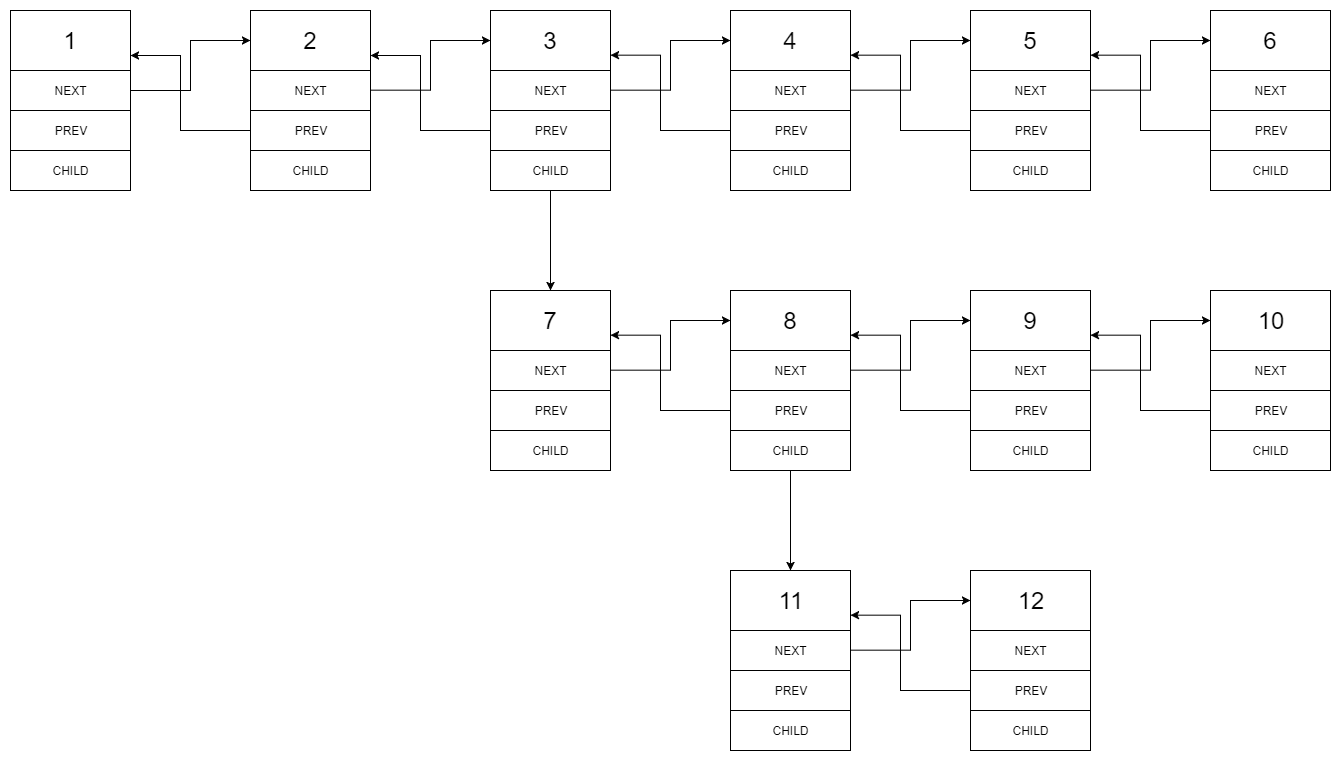Difficulty : Medium
Related Topics : LinkedList、DFS
leetcode Daily Challenge on July 10th, 2020.
You are given a doubly linked list which in addition to the next and previous pointers, it could have a child pointer, which may or may not point to a separate doubly linked list. These child lists may have one or more children of their own, and so on, to produce a multilevel data structure, as shown in the example below.
Flatten the list so that all the nodes appear in a single-level, doubly linked list. You are given the head of the first level of the list.
Input: head = [1,2,3,4,5,6,null,null,null,7,8,9,10,null,null,11,12]
Output: [1,2,3,7,8,11,12,9,10,4,5,6]
Explanation:
The multilevel linked list in the input is as follows:
After flattening the multilevel linked list it becomes:
Input: head = [1,2,null,3]
Output: [1,3,2]
Explanation:
The input multilevel linked list is as follows:
1---2---NULL
|
3---NULL
Input: head = []
Output: []
How multilevel linked list is represented in test case:
We use the multilevel linked list from Example 1 above:
1---2---3---4---5---6--NULL
|
7---8---9---10--NULL
|
11--12--NULL
The serialization of each level is as follows:
[1,2,3,4,5,6,null]
[7,8,9,10,null]
[11,12,null]
To serialize all levels together we will add nulls in each level to signify no node connects to the upper node of the previous level. The serialization becomes:
[1,2,3,4,5,6,null]
[null,null,7,8,9,10,null]
[null,11,12,null]
Merging the serialization of each level and removing trailing nulls we obtain:
[1,2,3,4,5,6,null,null,null,7,8,9,10,null,null,11,12]
- Number of Nodes will not exceed 1000.
1 <= Node.val <= 10^5
- Java
- mine
-
Recursive
Runtime: 1 ms, faster than 14.60%, Memory Usage: 37.3 MB, less than 85.00% of Java online submissions//O(N)time //O(1)space public Node flatten(Node head) { if (head == null) { return head; } Node res = new Node(); Node t = res; Node next; while (head != null) { next = head.next; Node child = head.child; head.child = null; head.next = null; t.next = head; t.next.prev = t; t = t.next; if (child != null) { Node cRes = flatten(child); t.next = cRes; cRes.prev = t; while (t.next != null) { t = t.next; } } head = next; } res.next.prev = null; return res.next; } -
DFS
Runtime: 0 ms, faster than 100.00%, Memory Usage: 37.3 MB, less than 89.09% of Java online submissions// O(N)time // O(C)space C is the count of node has child public Node flatten(Node head) { LinkedList<Node> list = new LinkedList<>(); Node res = head; Node t = res; while (t != null) { if (t.child != null) { if (t.next != null) { list.add(t.next); } t.child.prev = t; t.next = t.child; t.child = null; } else { if (t.next == null) { if (list.isEmpty()) { break; } t.next = list.removeLast(); } t.next.prev = t; } t = t.next; } return res; }
-
- mine
-
the most votes
Runtime: 0 ms, faster than 100.00%, Memory Usage: 37.7 MB, less than 75.00% of Java online submissions// O(N)time // O(1)space public Node flatten(Node head) { if (head == null) return head; // Pointer Node p = head; while (p != null) { /* CASE 1: if no child, proceed */ if (p.child == null) { p = p.next; continue; } /* CASE 2: got child, find the tail of the child and link it to p.next */ Node temp = p.child; // Find the tail of the child while (temp.next != null) temp = temp.next; // Connect tail with p.next, if it is not null temp.next = p.next; if (p.next != null) p.next.prev = temp; // Connect p with p.child, and remove p.child p.next = p.child; p.child.prev = p; p.child = null; } return head; }

